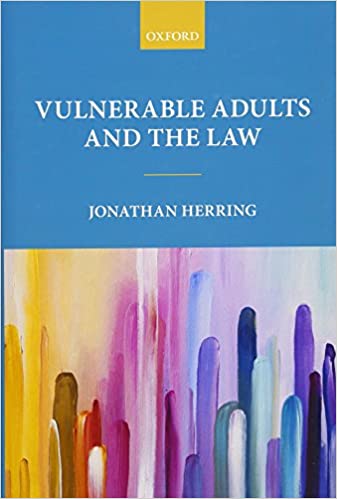Newly released
This book is new and will be uploaded as soon as it becomes available to us and if we secure the necessary publishing rights.

Vulnerable Adults and the Law Book PDF
(0)
Author:
Jonathan HerringNumber Of Reads:
70
Language:
English
Category:
Social sciencesSection:
Pages:
50
Quality:
excellent
Views:
902
Quate
Review
Save
Share
New
Book Description
We are used to thinking that most people have the capacity to make their own decisions; that they should be free to decide how to live their lives; and that it is a good thing to be self-sufficient. However, in an examination of the legal position of vulnerable adults, understood as those who
have capacity under the Mental Capacity Act 2005 but are deemed impaired through vulnerability in their exercise of decision making powers, Jonathan Herring challenges that assumption. Drawing on feminist and disability perspectives he argues that we are all in fact, 'vulnerable' and we need to
replace the competent, able-bodied, independent person as the norm which the law is based on and instead fashion which recognizes our interdependence and mutuality.
At the heart of the law is a distinction between those who have capacity and those who do not. Those who have capacity are given the full rights of the law; they are entitled to enter contracts, dispose of their property, are able to marry. Those who are deemed to lack capacity are unable to make
these decisions. Their decisions are made on their behalf based on an assessment of what is in their best interests. This approach is underpinned by the principle of autonomy, and is problematic for those who are deemed 'vulnerable'. The Court of Protection and the Court of Appeal have developed a
jurisdiction to deal with cases involving vulnerable adults which has been used in a wide range of cases from those involving people with early stage dementia to cases of forced marriage. This development of law has proved controversial and the courts have struggled to draw its limits and explain
the justification for it.
Jonathan Herring welcomes the courts willingness to protect vulnerable adults through the inherent jurisdiction, but argues that we need to go much further. It is not just particular groups such as 'the elderly' or 'the disabled' who are vulnerable, but rather vulnerability is part of the human
condition. This means that caring relationships are of central significance to our society and should be at the heart of the legal system.
Jonathan Herring
studied law at Hertford College, Oxford University before training as a solicitor. I did the BCL at Oxford and taught at Oxford and Cambridge, before taking up my fellowship at Exeter.
Outside work I love spending time with my partner and children, who are very funny. I also enjoy running, novels and foreign language films.
He research how the law relates with the things that matter most to us. Our family, our friends, our bodies. My writing questions the assumption that we are capable, independent, self-sufficient, autonomous people who need legal rights to protect us from invasion from others. Instead, I believe we are profoundly vulnerable and interdependent. We need a law which enriches and protects our relationships, rather than one that promotes individual rights.
Applying this kind of thinking I have written on a wide range of issues including caring; vulnerable adults; older people; children’s rights; marriage; ownership of body parts; pregnancy; rape; and disability.
He love teaching. At Exeter I teach Criminal Law, Family Law and Medical Law and Ethics for the BA degree in Jurisprudence.
Read More
Book Currently Unavailable
This book is currently unavailable for publication. We obtained it under a Creative Commons license, but the author or publisher has not granted permission to publish it.
Rate Now
5 Stars
4 Stars
3 Stars
2 Stars
1 Stars
Vulnerable Adults and the Law Quotes
Top Rated
Latest
Quate
Be the first to leave a quote and earn 10 points
instead of 3
Comments
Be the first to leave a comment and earn 5 points
instead of 3